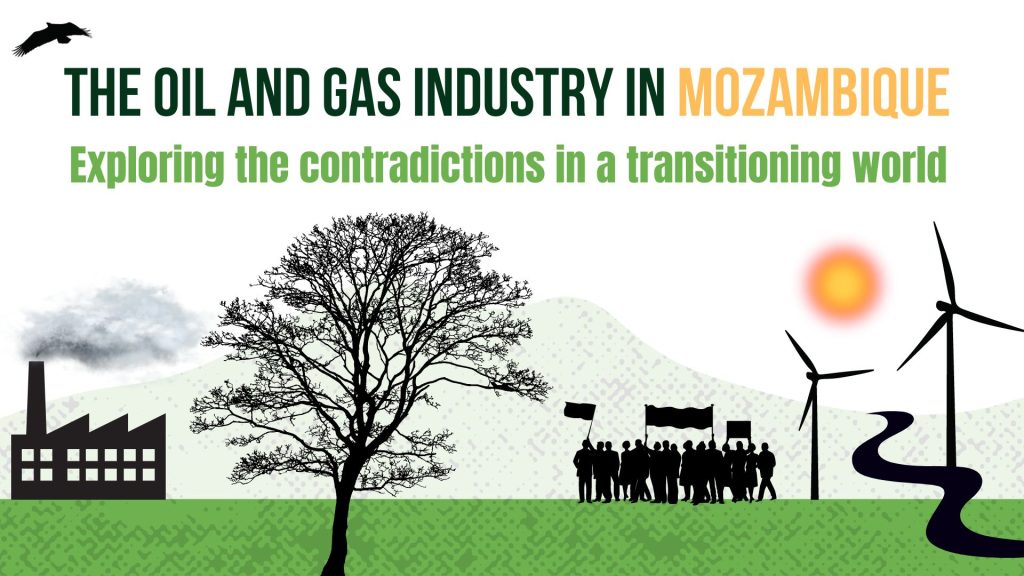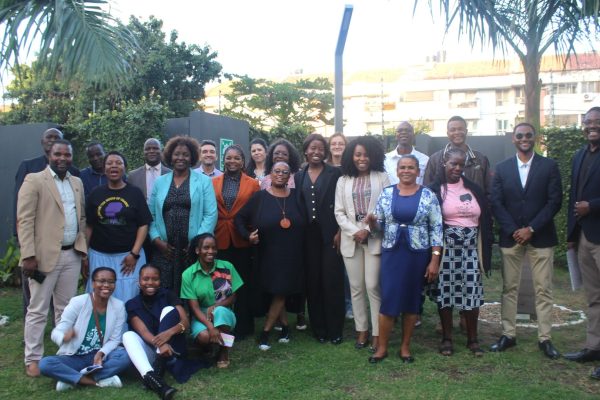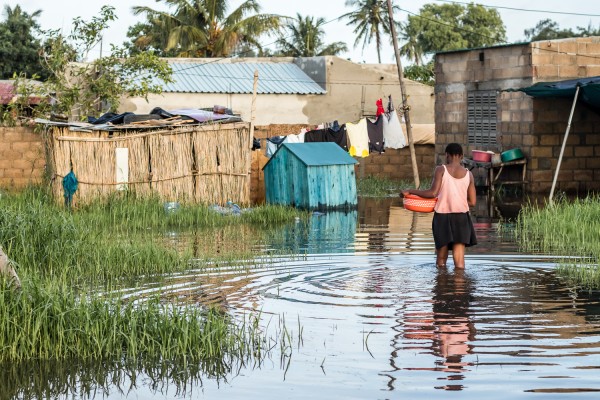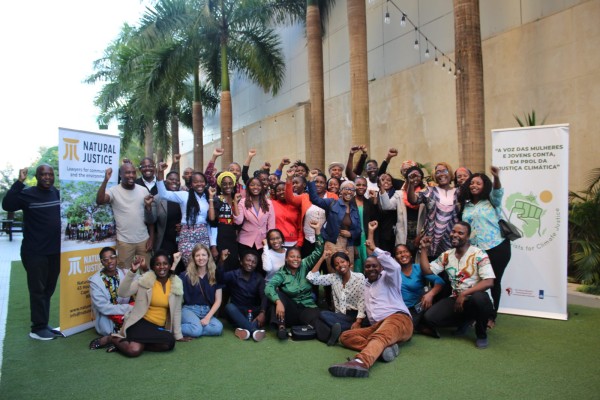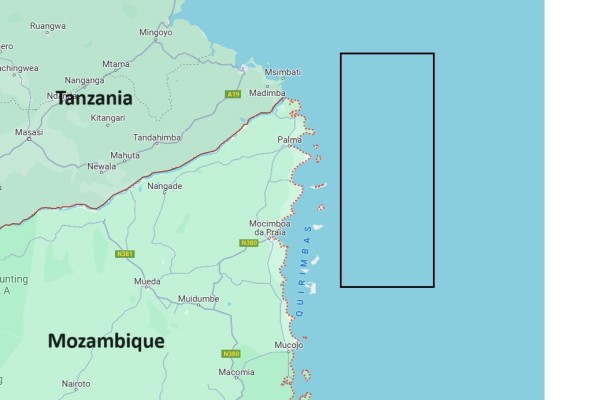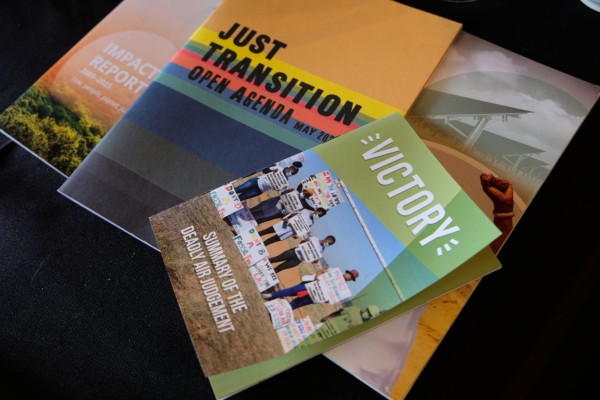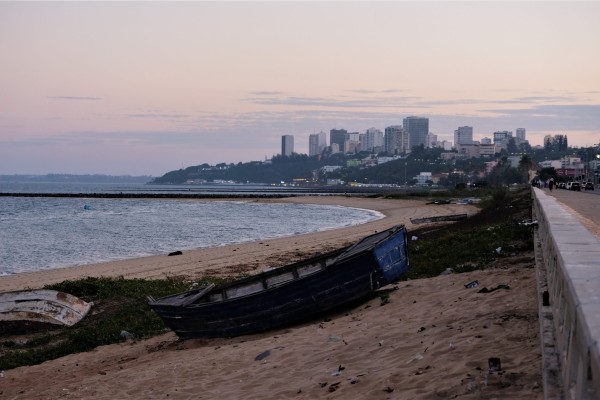Exploring the contradictions in a transitioning world
In order to explore the nature of a Just Energy Transition in Mozambique, as well as explore the contradictions of gas development in the country, Natural Justice is organizing a webinar on the oil and gas industry in Mozambique.
Speakers: Daniel Ribeiro (JA!), Leopoldina Gouveia (Natural Justice), Lauren Nel (Natural Justice)
- Date: 23 August 2023
- Time: 15:00-16:30 CAT
- Zoom Registration link: https://us06web.zoom.us/webinar/register/WN_rVnXjr3nQ8aBktXPxus9qQ
- Languages: English and Portuguese
BACKGROUND
Gas reserves in Mozambique: Mozambique has large gas reserves. In 2010, Mozambique announced the discovery of a total of 277 trillion cubic feet of natural gas reserves in the Northern Province of Cabo Delgado – later regarded as the largest natural gas discovery in the last 20 years. Mozambique has opened itself up to large investments in hydrocarbons and invited oil companies to its shores. The country has become attractive to companies such as Total, ExxonMobil, ENI, STAOIL, GALP, China National Petroleum Corporation and Sasol.
Gas’ contribution to development: It is believed that current and future gas projects will contribute to the transformation of the country and make Mozambique one of the world’s largest natural gas producers and one of the largest Liquefied Natural Gas (LNG) suppliers. The predicted supply of goods and services throughout the value chain (electricity generation, fertilizer production, methanol, liquid fuels) will create space for the growth of small and medium-sized enterprises and improve employment opportunities and the living conditions of Mozambiquans.
The Gas Master Plan: Mozambique’s Gas Master Plan was approved in 2014 and its main objective is, “the fight against poverty and improvement of the living conditions of Mozambicans in an environment of peace, harmony and tranquillity.” Under its auspices, the government has approved a whole package of strategies, plans and laws for the implementation of at least three major Liquefied Natural Gas (LNG) production projects; namely, Coral Sul FLNG, Golfinho/Tuna and Rovuma LNG.
Gas contributing to climate change: Despite international attention being given to gas as a “transitioning fuel” with apparent less emissions potential than coal, a large component of the emissions of gas is methane. Methane (CH4) is a powerful gas – responsible for more than 25% of global warming. Methane constitutes the largest constituent of natural gas, and is 80 times greater than carbon dioxide in terms of Global Warming Potential.
Mozambique and climate vulnerabilities: Mozambique is one of the most vulnerable countries in the world to climate change impacts and is the third most vulnerable country in Africa. In 2020, Mozambique submitted an updated Nationally Determined Contribution under the auspices the Paris Agreement and United Nations Framework Convention on Climate Change. Noting that the country is already facing the adverse impacts of climate change, and loss and damage associated with extreme climate events, Mozambique committed to reduce carbon emissions by 40 million tCO2eq between 2020 and 2025.
THE PROBLEM STATEMENT
Mozambique’s Constitution, under Article 90, states that, “every citizen has the right to a safe and balanced environment”. The Constitution also establishes that the state, to fulfil the right to a safe and balanced environment, guarantees the rational use of natural resources while safeguarding their capacity for renewal, ecological stability and the rights of future generations (art. 117/2, d).
In terms of this right, and its international obligations, the Mozambiquan government has an obligation to reduce its emissions and protect the environment for future generations. Yet, the government has identified gas developments as a catalyst for economic development and continues to award concessions to companies.
While these contradictions are not unique to Mozambique, certain factors at play in Mozambique make the dependence on gas more complicated.
Resource-based conflict: Since 2017, the northern province of Cabo Delgado, where Total has the largest multibillion LNG project in Africa, has seen military violence and internal armed conflict – leading to Total declaring a force majeure (forced closure). At the start of the project, land expropriation and forced resettlement affected over 500 families. The process was allegedly marred by intimidation and pressure by the local government officials and military.
Poor protection of land rights: Mozambique does not recognise the right to Free, Prior and Informed Consent and has no legal framework to regulate communities’ participation in decision-making regarding land and natural resources. As the only “owner” of the land, decisions on land use can be arbitrary and destructive, and make communities’ rights more tenuous. Oil and gas companies are then free to use community land for the projects, while communities suffer.
De-localising carbon emissions: Despite committing to reduce its carbon emissions through its Nationally Determined Contributions (NDC),Mozambique has not submitted a long-term strategy on addressing climate change mitigation and they have not developed a plan that outlines their net zero targets.Oil and gas companies seeking profits continue to set up facilities in Mozambique. Mozambique is then supporting “passager clandestin“ (translated to mean “free riders”) – countries that allow “delocalisation” of the most polluting companies to countries with lower greenhouse emissions.
Internal displacement and climate refugees: In 2022, the UN Refugee Agency raised an alarm over Mozambique’s “invisible” crisis as climate change shocks worsen displacement. The armed conflict in the north, combined with climate-related hazard such as cyclones, floods and droughts, are increasing the number of internal displaced persons and disrupting livelihoods.
A Just Transition: These issues and others make a case for a just energy transition to be prioritised in Mozambique. And yet, billions of dollars are being invested in the fossil fuel industry in Mozambique. Despite this, Mozambique has made commitments to transition to a clean energy system by 2030 and has adopted strategies towards climate change mitigation and adaptation, and the growth of renewable energy to phase out fossil fuels. A just energy transition offers opportunities to rethink how a country like Mozambique provides universal energy access and supports environmental and social justice.

